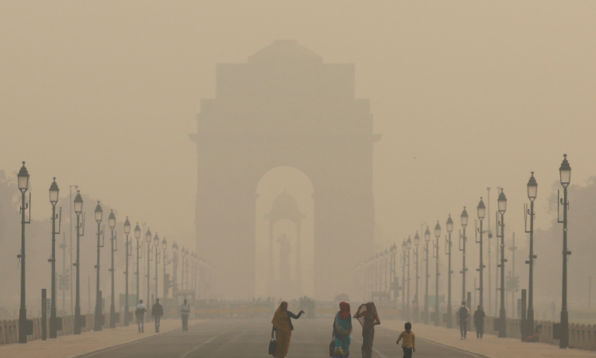When we think of Delhi’s AQI right now, the first things that come to mind are coughing and respiratory issues. All the health advisories are telling us to stay indoors to protect our physical health. But what about our mental health?
We recently spoke with Ms Aarushi Kohli, a mental health professional from Delhi, about the less obvious impact of air pollution on our well-being. She confirmed that Delhi’s poor AQI does affect our mental health, and it can feel surprisingly similar to anxiety. Let’s dive into how Delhi’s hazardous AQI is affecting us mentally and what we can do about it.
The link between pollution and anxiety

Ms Kohli broke it down into two ways pollution affects our mental health. The first, she explained, is how pollution mimics anxiety. Nausea, fatigue, headaches – all of these are classic symptoms of anxiety, but they’re also common reactions to polluted air. “You might feel like you’re anxious,” Ms Kohli said. “But actually, you’re not – it’s the pollution that’s making you feel that way.” This confusion is what can trigger more stress.
The second way pollution messes with our minds is through the larger consequences of living in such an environment. Ms Kohli put it into perspective: “It’s a lot similar to the Covid-19 pandemic. Schools are shut down. You can’t go outside. If you’re into athletics, you can’t go out and play because it’s just too hazardous. And if you’re forced to go out for work, that in itself is stressful. You’re battling with how polluted the air is and the toll it takes on you, but at the same time, you still have to keep up with your work and life demands. It’s like a double layer of stress.”
That’s when it hits you – pollution isn’t just physically draining, it’s mentally exhausting too. We’re constantly grappling with the mental toll of just getting through the day in such an environment.
How pollution impacts your body and mind
It’s not news to anyone that our physical and mental health are deeply connected. Ms Kohli emphasised this point. “When you breathe polluted air, your body reacts as though it’s in danger. Your nervous system goes into fight-or-flight mode, which is essentially a stress response.”
For those already struggling with mental health issues, this can make matters worse. Ms Kohli explained that her clients who have a history of anxiety found themselves triggered by pollution in ways that feel eerily familiar. “It’s almost like a reminder of when you had anxiety – what that was like. My clients told me we feel anxious but we are not anxious about anything,” she shared.
The worst part about Delhi’s current AQI is that the damage caused by it doesn’t just stop when the air quality improves. Ms Kohli pointed out that the long-term effects are a serious concern, especially for children. “Unlike adults, they can’t find alternatives to their daily life. They experience a sense of helplessness, stress, and isolation. These feelings during formative years can shape their outlook on life, creating a template for how they handle challenges as adults.”

For adults, the long-term impact can be equally damaging. “It’s a domino effect,” Ms Kohli explained. “Physical discomfort leads to mental stress, which then affects relationships, work, and overall quality of life.” Repeated exposure to pollution can lead to chronic stress, difficulty concentrating, and even depressive symptoms.
But it’s not just the younger generation who feels the long-term toll. Older adults, already facing physical limitations due to age, experience even more stress when pollution restricts basic activities like walking or socialising. Ms Kohli said, “They’re already more alienated from society due to their physical restrictions, and this just makes it worse.”
This also tells us that pollution impacts different age groups differently, so it becomes even more important to be careful about how you deal with it.
How can you cope with this?
While addressing air pollution on a systemic level is essential, Ms Kohli shared some practical ways we can protect our mental health in these times.
1. Express your emotions
Ms Kohli emphasised the importance of acknowledging and expressing how you’re feeling. “Especially for parents, encourage your kids to express how they’re feeling about all of this,” she said. “Teach them to name what they’re feeling – anger, frustration, sadness and let them know it’s okay to feel that way.” This applies to adults, too. Feeling overwhelmed or anxious? Talk it out, whether through journaling, venting to a friend, or seeing a therapist. Expressing your feelings can make a huge difference in how you cope.
2. Bring nature inside

Since we’re cut off from nature right now, Ms Kohli suggested incorporating elements of nature into your indoor space. “Sometimes just watching a sunset from your window or having indoor plants can provide a calming effect,” she said. Ms Kohli pointed out that eco-therapy and environmental psychology are emerging fields that recognise the connection between the environment and our mental health. “Nature-based therapies, like using natural elements in therapy or focusing on green spaces, are becoming more common.” So, spending time in nature or integrating nature into your daily routine isn’t just relaxing – it’s good for your mind.
3. Practise mindfulness and relaxation
Mindfulness exercises, like deep breathing or progressive muscle relaxation, can help calm your nervous system and ease the stress that pollution triggers. Ms Kohli advised, “These simple practices help break the cycle of stress that pollution can cause.” Taking just a few minutes each day to focus on your breath or relax your muscles through any form of movement can have a huge impact on reducing anxiety and mental fatigue.
4. Seek professional help early

Ms Kohli also emphasised that therapy isn’t just for times of crisis. “You don’t have to wait for life to spiral out of control to reach out for help,” she said. “If you notice persistent stress, irritability, or changes in your physical health, talking to a therapist can help you get back on track.”
As we all continue to face the effects of poor air quality, it’s important to remember that taking care of our mental health is just as essential as taking care of our physical health.
If you want to reach out to Ms Kohli for professional help, you can find her here.
Featured Image Source
Related: Dr Era Dutta x All About Eve: Mental Health Illnesses, Suicide Awareness, And More

 Web Stories
Web Stories













